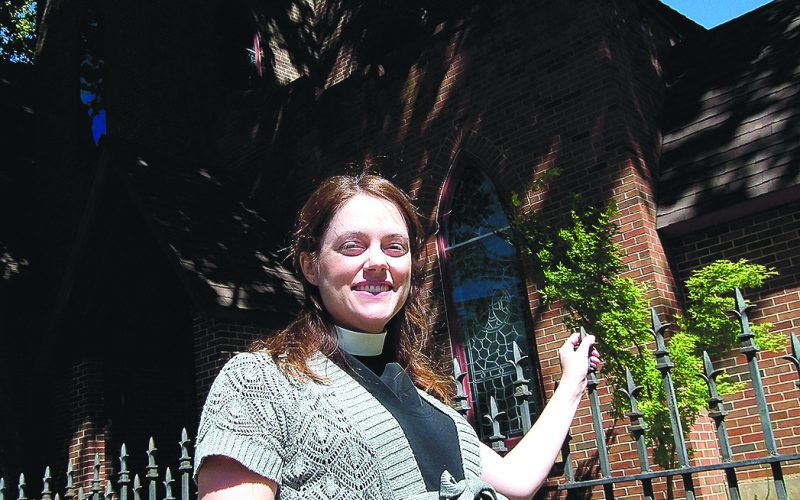
Photo By Terrah Baker
The Rev. Dr. Lora Walsh works at St. Paul’s Episcopal Church in Fayetteville, and is one of two female priests to hold positions of leadership within the church.
“The long struggle for women’s ordination as priests in the American Episcopal Church began in the mid-1850s and lasted almost 125 years. It ended on Sept. 16, 1976 in Minneapolis, Minn., when the General Convention of the Episcopal Church voted to approve women’s ordination to the priesthood and the episcopate.” — Minnesota Historical Society
Women Accepted As Church Leaders
Staff Report
In many religions practiced in the U.S. and around the world — Catholic, Islam, Church of Jesus Christ of Latter-day Saints to name a few — women are not allowed to hold certain leadership positions. In the religious institutions where women leaders are allowed, a long, hard battle was most likely fought.
The Episcopal Church, like St. Paul’s on North East Avenue in Fayetteville, is one of those churches that fought and ultimately won. But Suzi Freeman, Administrator at St. Paul’s, remembers when it was a struggle for their parish to accept women as priests even after the rules had been changed.
“I remember people years and years ago leaving because of female priests. It was something new and they just didn’t agree with that,” she said.
But if you look at St. Paul’s leadership today, you won’t see obvious signs of sexism within the ranks. Three of the five priests on staff are women, to include the first female priest hired at St. Paul’s, Lynne Spellman, also a professor at the UA.
One of their newest clergy members, Lora Walsh, grew up in an era where women had already won the right to become priests, and she knew from a young age it was a possibility. Despite growing up with many strong female role models, Walsh does remember times of struggle for gender equality within the minds of fellow church members.
After a female and male minister spoke at a church event during her young adulthood, Walsh was talking with female members about the roles of men and women in religion. According to them, and parts of The Bible, women shouldn’t teach or give council in the church.
“One of the girls said ‘Well, I don’t think she should’ve given that talk.’ I couldn’t believe it. The belief was that women should not give instruction to men. So, you can give that talk, but only if only women were present,” Walsh explained.
The church she attended as a child hired their first female priest in the mid 1980s. But it wasn’t until attending a cathedral in San Diego, Calif., that Walsh found a mentor.
“She had become a priest in her 40s and had a background as a sex therapist and in Native American studies. I remember her bookshelves with titles like ‘The Female Orgasm’ next to ‘Marx Interpretation of Jesus,’” she said.
This variety can be seen in Walsh’s life as well — from volunteering at an orphanage in Nepal to staying on an organic farm in Italy. She wanted to experience as much as possible before committing to her life as a priest.
She moved back to Chicago and entered a Ph.D. program at Northwestern University in 2004, which gave her the stability she needed to traverse the long process of being ordained.
The process included being a member of a church for one year, holding a leadership position in ministry, and gaining approval from a bishop. She then had to write essays, organize a committee to review her, attend a workshop held once a year to be interviewed, have psychological evaluations and work with others looking to be ordained.
For Walsh, and many others, the process took seven-and-a-half years to complete. She said she never questioned her acceptance as a priest, and hasn’t been made to by outside forces. Even when prejudices arise in The Bible or sermons of other religious leaders, Walsh recognizes that these are anecdotes for a very complicated world — one in which women priests are becoming as common, and as respected, as men.
“There are prejudices reflected in The Bible but it’s about finding the people in The Bible who are working against them and identifying with them,” Walsh explained.



